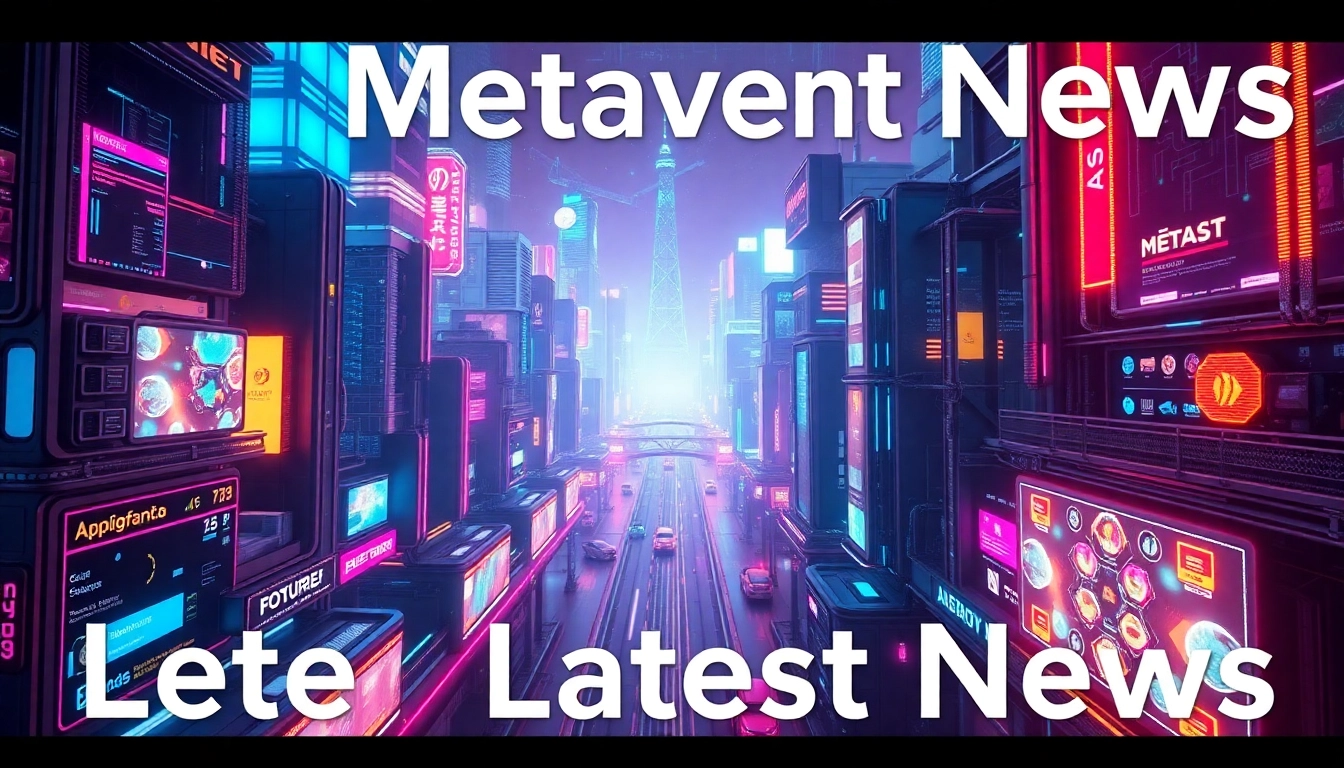Understanding the Current Landscape of the Metaverse
The concept of the Metaverse Latest News continues to evolve rapidly, shaping the future of digital interaction, commerce, and social connection. As a collective virtual space combining augmented reality (AR), virtual reality (VR), blockchain technologies, and advanced networking, the metaverse is shifting beyond speculative innovation towards concrete applications impacting daily life and business strategies. In 2023, awareness of its growing significance has reached new heights, driven by technological breakthroughs, substantial investments, and strategic partnerships among global tech giants.
Defining the Metaverse and Its Growing Significance
The metaverse refers to an expansive, immersive digital universe where users can interact with environments, objects, and other participants in real-time. Unlike traditional internet browsing, it offers an embodied experience that blurs the line between physical and digital realities. Major factors underpinning its increasing importance include the rise of remote work, digital economies, and the demand for engaging social platforms. Top corporations recognize its potential; for example, Meta (formerly Facebook) has committed billions towards developing metaverse infrastructure, signaling its strategic priority for the future of social and commerce interactions.
Recent Developments in Metaverse Technologies
Technological advances in AI, blockchain, 5G, and edge computing have accelerated metaverse development. Notable progress includes the refinement of VR headsets, making devices more affordable and comfortable, and the enhancement of spatial audio and haptic feedback to increase immersion. Furthermore, blockchain integration enables secure ownership and transfer of digital assets, including NFTs, underpinning new monetization models. A recent breakthrough has been the deployment of AI-powered avatars capable of nuanced interaction, elevating virtual socialization to more human-like exchanges. These innovations are instrumental in transforming the user experience from novelty to necessity.
Major Players and Market Trends in 2023
Leading technology firms such as Meta, Microsoft, Epic Games, and NVIDIA are spearheading metaverse initiatives. Meta’s Horizon Worlds continues to expand its user base, while Microsoft leverages its Azure cloud platform for scalable metaverse solutions, especially in enterprise collaboration. Similarly, Epic Games’ Unreal Engine powers highly realistic virtual environments commanding attention from developers and brands alike. Market data reveals a surge in investments, with estimates predicting the metaverse market could surpass $1 trillion by 2025. Trends also indicate a diversification of platforms, with aggressive moves into AR glasses, wearable tech, and blockchain-enabled assets to entrench the metaverse into mainstream usage.
Latest Innovations and News in the Metaverse Scene
Breakthrough Projects and Collaborations
Recent months have seen groundbreaking projects, such as Meta’s ambitious expansion of Horizon Worlds, which now incorporates advanced AI-driven environments. Collaborations between tech giants and industry leaders, like Epic Games partnering with sports brands to create virtual stadiums, exemplify the rapid adoption of metaverse environments for entertainment and advertising. Additionally, notable startups have launched immersive social platforms tailored for specific niches such as education and retail, emphasizing the expanding use cases. These projects often incorporate hybrid solutions, integrating physical-world data to create seamless virtual experiences, thereby fostering greater user engagement.
Corporate Investments and Strategic Partnerships
Venture capital funding in metaverse startups has hit record levels, with total investments reaching into billions. Companies like Tencent, Apple, and Samsung have announced initiatives toward AR glasses and headset development, signaling their commitment to capturing early market share. Large-scale strategic alliances include collaborations between game developers and fashion brands to create virtual apparel, providing new revenue streams. Notably, financial giants such as JPMorgan and Goldman Sachs are investing heavily, envisioning the metaverse as a critical component of future financial services and digital ecosystems. These investments demonstrate an understanding that the metaverse’s value extends well beyond social interaction into commerce, finance, and enterprise solutions.
Impacts on Social and Business Interactions
The integration of metaverse platforms is transforming how individuals and organizations connect. Virtual workspaces are now commonplace in sectors ranging from tech to manufacturing, enabling remote collaboration with near face-to-face engagement. Companies are leveraging virtual showrooms, allowing consumers to explore products interactively, leading to enhanced purchasing confidence. The social layer also introduces new entertainment paradigms, such as virtual concerts and conferences attracting millions globally. These shifts are prompting businesses to rethink customer engagement strategies, emphasizing seamless, immersive experiences that foster loyalty and brand differentiation.
Implications of the Latest Metaverse News for Investors and Developers
Investment Opportunities and Risks
Investors keen on the metaverse landscape should consider a diversified approach, focusing on companies with strong innovation pipelines and strategic partnerships. Non-fungible tokens (NFTs) and digital real estate are emerging as assets with high volatility but significant upside potential. Nevertheless, risks persist due to regulatory uncertainties, technological hurdles, and potential market saturation. Due diligence is essential, including evaluating a company’s technological readiness, user adoption metrics, and compliance strategies, to mitigate risks and optimize returns.
Emerging Standards and Regulatory Challenges
As the metaverse matures, regulatory frameworks are evolving. Issues such as data privacy, ownership rights, and content moderation are at the forefront. Regulatory bodies in the EU and US are examining ways to enforce consumer protections in digital environments, potentially imposing stricter rules on virtual asset transactions and digital identity verification. Developers and investors must stay updated on these standards and actively participate in shaping feasible regulatory policies to safeguard their interests while fostering innovation.
Best Practices for Navigating Metaverse Adoption
Successful adoption hinges on strategic planning. For businesses, this involves maintaining agility, investing in scalable infrastructure, and prioritizing user-centric design. Early pilot programs and collaboration with tech providers can help identify suitable platforms and technologies. Developers should focus on interoperability, ensuring their applications work seamlessly across multiple environments. Consistent monitoring of user engagement data and feedback guides iterative improvements, ensuring robustness and relevance of metaverse solutions.
How to Stay Updated with the Latest Metaverse News
Top News Sources and Industry Reports
Staying informed requires reliance on reputable sources. Leading industry reports from firms like McKinsey, Gartner, and Deloitte offer in-depth analyses of trends and forecasts. Tech news outlets such as TechCrunch, CoinDesk, and The Verge provide timely updates on innovations and corporate moves. Following official blogs, white papers, and announcements from key players ensures access to firsthand insights, enabling proactive decision-making.
Engaging with Community Events and Webinars
Active engagement with industry communities, conferences, and webinars fosters networking and knowledge acquisition. Events hosted by the Virtual Reality Developers Conference, Decentraland Summit, or AR/VR World offer opportunities to learn from pioneers, explore emerging frameworks, and discuss challenges. Participating in such discussions builds expertise and uncovers potential collaborations or investment opportunities.
Utilizing Analytics Tools for Trend Tracking
Advanced analytics platforms enable tracking of metaverse-related mentions, user growth metrics, and sentiment analysis. Tools like Google Trends, social listening platforms, and blockchain analytics provide valuable data to anticipate shifts and adapt strategies accordingly. Regularly analyzing these metrics supports timely pivoting and identification of promising projects or markets.
Future Outlook and Strategic Insights
Predicted Growth and Technological Advancements
Industry experts project the metaverse to experience exponential growth, driven by innovations in AI, blockchain, and hardware technology. The integration of AI avatars, realistic physics engines, and improved haptic feedback will deepen immersion. 5G and future 6G networks will facilitate seamless connectivity, ensuring high-quality experiences across devices globally. As infrastructure matures, we can expect more user-friendly platforms and broader adoption across sectors like education, healthcare, and enterprise solutions.
Potential Disruptions and Opportunities
Disruptions may include regulatory clampdowns, privacy concerns, and technological barriers in accessibility. Conversely, these challenges open opportunities for innovators to develop privacy-preserving protocols, interoperability standards, and affordable hardware. Early entrants that successfully navigate these complexities can establish dominant positions and create new business models, from virtual real estate to tokenized assets.
Preparing Businesses and Users for the Next Phase
Enterprises should prioritize investing in scalable, flexible metaverse infrastructure and cultivating consumer trust through transparent policies. Users require education on digital asset management, security, and digital etiquette. Developing cross-platform solutions and fostering inclusivity will ensure wider participation, making the metaverse a truly universal space for innovation, commerce, and social interaction.









